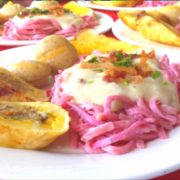
Food technology/ chemistry has long been in the area of specialty of Philippine researchers and scientists.
Utility Models (UMs) applications with the Intellectual Property Office of the Philippines (IPOPHL) has historically been dominated by resident filings, considering it’s more affordable and relatively easier to acquire than invention patents. The UM is intellectual property dealing with minor improvements.
By field of technology, local UM applications have concentrated on food technology since 2014, proof that local innovators still think with their stomach, and that the food and beverage industry is still their target market.
Take it from Fairie Anne Acebedo-Domingo, a graduate of Food Technology and assistant Professor of Food Product Development at the Mariano Marcos State University (MMSU) in Ilocos Norte. Acebedo-Domingo registered an oddly amusing innovation of a method to create pink noodles – using her locale’s sought-after produce, the dragon fruit. Dragon fruit is a high value fruit. The peel, of course, is part of the weight from which the cost is computed.
While currently not available on a commercial scale, the Pink Noodles showcases the innovative streak of Filipino researchers – in this case, capitalizing on the abundance of the dragon fruit while helping her province’s drive to be the dragon fruit capital of the Philippines.
Similar to the trash-to-treasure principle of the famed Cebu mango biorefinery plant, Ms. Acebedo-Domingo hoped to transform the waste from the dragon fruit, the peel, into a usable product.
“We were actually targeting production of jams and baked goods, and we didn’t want to throw away the peel. I got to thinking: how can we use the peel to minimize waste? That’s when we thought of incorporating it with the flour and make noodles out of it. It’s just a by-product,” said Ms. Acebedo-Domingo.
But this innovation is not just for the sake of quirkiness; Acebedo emphasized that some of the technology from the dragon fruit product development is being taught to dragon fruit farmers, as an extension activity of MMSU. This way, farmers themselves can make value-added products from the fruit.
IPOPHL has had a hand in this IG-worthy innovation too – and not just as the regulatory agency. The utility model for pink noodles was borne out of a patent writeshop it conducted in MMSU.
“IPOPHL conducted training on patent drafting before, and this was what I drafted. Luckily it was approved. There are other UMs we’re thinking of developing and submitting to IPOPHL,” added Ms. Acebedo, declining to disclose them.
IPOPHL’s Documentation, Information, and Technology Transfer Bureau organizes Patent Search and Patent Drafting Writeshops to aid IP creators to commercialize their research. The Bureau of Patents’ examiners lead these writeshops on patent drafting. University researchers and academics, many of whom are uninitiated in methods of patent drafting, are among the many who have benefitted from this program.
In this program, participants are required to bring at least one technology for patent (invention, utility model or industrial design) filing to be drafted and eventually filed with IPOPHL at the end of the writeshop, thus obtaining intellectual property protection for their work.
–
News release from the Intellectual Property Office of the Philippines. For more information, visit the IPOPHIL at https://www.ipophil.gov.ph. *For inquiries on the Pink Noodles, Ms. Fairie Anne Acebedo-Domingo may be reached at f.acebedo16@gmail.com.






